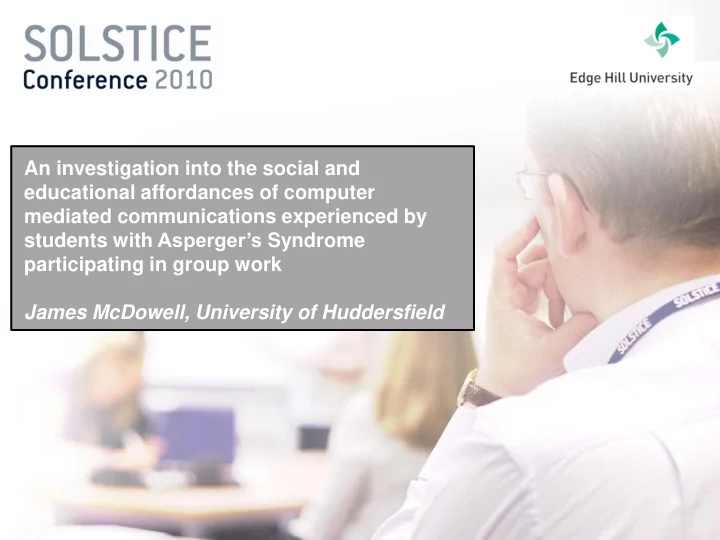

An investigation into the social and educational affordances of computer mediated communications experienced by students with Asperger’s Syndrome participating in group work James McDowell, University of Huddersfield
Asperger’s Syndrome … • Located in the spectrum of autistic disorders • Characterised by a “triad of impairments”: ◦ social interaction, communication, imagination ◦ (Wing & Gould, 1979; Attwood, 2003) • IQ usually within the normal or above normal range ◦ (Klin & Volkmar, 2000) • A pervasive developmental disorder covered by: ◦ Disabilities Discrimination Act (1995), and ◦ Special Educational Needs and Disability Act (2001)
An inherent tension … Note: c.5-10% of our computer games students are diagnosed with Asperger’s Syndrome
Introducing ‘Alex’ … • A male undergraduate, c. 20 years old, diagnosed with Asperger’s Syndrome • Observable anxiety in studio situations • Always sat in the rear corner seat in the studio • Difficulties in 1 st year, nearly dropped out • Supported by a Disability Support worker • In 2 nd year of the course developing a game in a self- selecting team with 3 neurotypical students
A problem and a solution … The Course: FdSc Computer Games Technology • Traditional documentation a weak area • Needed a solution for the whole class ◦ Blogging tool and online collaborative working facility e-portfolio system • Popularity of social networking in U25s Mahara – a free e-portfolio system with SN
The e- portfolio system … More info and free software download available at http://www.mahara.org
What happened first … • All students asked to create their profile within the first two weeks of term ... • Within two hours, all students had: ◦ created a profile ◦ selected a nickname ◦ uploaded a photo or other identifier image • ... and some had created special interest groups
What happened next … • Alex created his group’s discussion forum in Mahara, initiating the opening thread … “I guess we should probably pitch ideas and things here?” • … and then uploaded concept artwork, both asking his peers for feedback and offering it … • Disabilities support staff suggested this was unusual and worthy of further research …
Conducting a case study … • This led me to conduct a qualitative case study as part of my PhD work, incorporating … ◦ Literature review ◦ Regular referrals to ‘expert witnesses’ ◦ Observation of in-studio behaviour ◦ Observation of online activity in Mahara ◦ Email interviews
Initial analysis of the data … • A comparative analysis of the email interview data identified a pattern of high frequency usage of collective-inclusive phraseology by Alex: “ It's helped us to share files more frequently and easily than we could have otherwise done; without it, we'd probably have to send large emails or pass around pen drives all the time to keep everyone up to date, whereas with Mahara we can get the files to each other and update them a lot easier. ” (my emphasis) … a pattern not evident in the neurotypical group: “It has had a fairly significant effect. Having to blog every week both refreshes the memory of what has been previously written and makes me think „What have I done this week and what will I do next week?‟” ( Neurotypical Participant 1)
The findings of the case study … Six key predictions were identified and tested: … continues overleaf …
The findings of the case study …
Limitations of the case study … • A single- case case study … ◦ Unique factors, e.g. Alex, the group dynamic ... • Purely qualitative, self-reporting ... • Issues of generalisability ... • But, could the case constitute a ‘Black Swan’?
Final observations … • Social affordances and outcomes ◦ By the end of Semester 2, Alex was observed engaging in conversation with peers three rows of PCs away ... ◦ His confidence and self-esteem are clearly boosted ... ◦ He is much more closely integrated with peers ... ◦ There is a real possibility for Alex to make a successful transition from study to work in the games industry
Final observations … • Educational affordances and outcomes ◦ Alex was afforded the opportunity to successfully participate in a collaborative group work activity ... ◦ He received an A grade for the module ... ◦ He has now completed his course of study and will be progressing to the award of the qualification ... ◦ He has the opportunity to proceed to the top-up course which leads to the award of the full BA(Hons)
Further research … • PhD at Lancaster University ◦ Expanding the case-study to investigate the potential of collaborative games and simulations ... ◦ Using mixed methods, combining: ◦ Qualitative, self-reporting via email interviews and observations of online and offline activity while working in collaborative situations ... ◦ Quantitative study investigating measurable improvements of academic achievement, and career development within the workplace ...
An application in progress … • UoHTube Project ◦ Step-by-step game development video tutorials ... ◦ Development of an inclusive online ‘learning community’, where students work together, sharing best practice and creating learning materials ...
James McDowell School of Computing and Engineering University of Huddersfield Email: j.b.mcdowell@hud.ac.uk
Recommend
More recommend